英语九百句听写(四)
法律基础资料英语九百句(1-30)
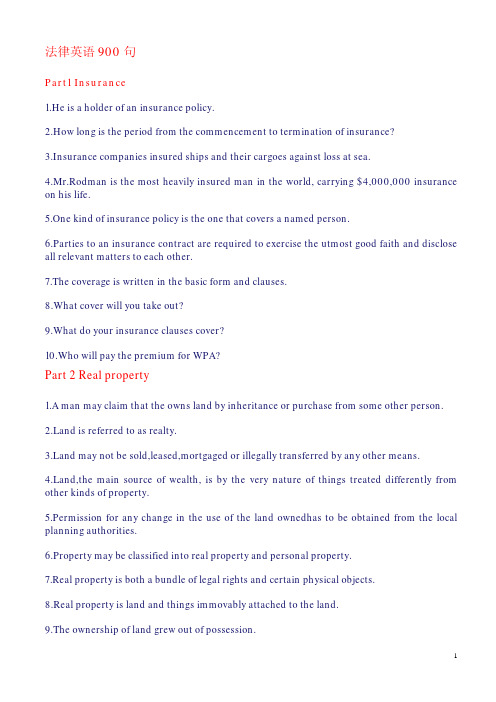
法律英语900句Part1 Insurance1.He is a holder of an insurance policy.2.How long is the period from the commencement to termination of insurance?3.Insurance companies insured ships and their cargoes against loss at sea.4.Mr.Rodman is the most heavily insured man in the world, carrying $4,000,000 insurance on his life.5.One kind of insurance policy is the one that covers a named person.6.Parties to an insurance contract are required to exercise the utmost good faith and disclose all relevant matters to each other.7.The coverage is written in the basic form and clauses.8.What cover will you take out?9.What do your insurance clauses cover?10.Who will pay the premium for WPA?Part 2 Real property1.A man may claim that the owns land by inheritance or purchase from some other person.nd is referred to as realty.nd may not be sold,leased,mortgaged or illegally transferred by any other means.nd,the main source of wealth, is by the very nature of things treated differently from other kinds of property.5.Permission for any change in the use of the land ownedhas to be obtained from the local planning authorities.6.Property may be classified into real property and personal property.7.Real property is both a bundle of legal rights and certain physical objects.8.Real property is land and things immovably attached to the land.9.The ownership of land grew out of possession.10.Where a squatter occupies derelict land and continues in uninterrupted possession for 12 years, the owner's title to land is destroyed.Part 3 Encumbrance1.A landowner who already holds land subject to a mortgage may wish to hypothecate his equity.2.A lien against the property is granted to secure an obligation.3.A pledge is something more that a mere lien and something less than a mortgage.4.After the court imposed the lien, it usually issues a writ directing the sheriff to seize the property.5.If the purpose of the transaction is to transfer property for security only, then the courts will hold the transaction a pledge.6.It is a charge on land.7.He decided to redeem the pledge.8.Mineral rights are not mortgageable in this jurisdiction.9.Mortgage is a security interest in real property.10.The debtor whose property is subject to the mortgage is called the mortgagor.Part 4 Process1.Address of service of process shall be included in the Articles of Association.2.Alias summons is a subsequent summons issued to replace onethat could not be served or otherwise failed.3.Smith was subpoenaed as a witness to appear in the circuit court.4.Summons is a written notification that one is required to appear in court.5.The bailiff was in charge of issuing a summons on the plaintiff.6.The court served a summons on him.7.The summons was withdrawn.8.The witnesses were subpoenaed to attend the trial.9.The writ was indorsed with details of the plaintiff's claim.10.They were accused of demanding payment with threats.Part 5 Judge1.A good judge can extend the boundary of justice.2.A judge cannot be witness in his own cause.3.A judge cannot punish a wrong done to himself.4.A judge incurs no civil liability for judicial acts,even if guilty of fraud and corruption.5.An upright judge has more regard to justice than to me.6.If the judge departs from the sentencing guideline range he must have a lawful reason for such a departure.7.Judges shall handle cases impartially and in accordance with the law.8.Most disputes that arise in any society are not handled through the court system.9.No one can be at once suitor and judge.10.No one can be judge in his own case.11.Sentencing is at the discretion of the judge.12.The chaiman of the tribunal asked to see all the facts on the income tax claim.13.The judge was appointed to sit in a special case.14.The magistrates committed her for trial at the Crown Court.15.The judge accepted the defendant's undertaking not to harass the plaintiff.16.The judge decided in favor of plaintiff.17.The judge disallowed the defense evidence.18.The judge exceeded his powers in criticizing the court of appeal.19.The judge found that the plaintiff's pleadings disclosed no cause of action.20.The judge heard the case in chamber.21.The judge must not hear the evidence or the representations from one side behind the back of the other.22.The judge ordered the actions to be consolidated.23.The judge refused the application, on the ground that he had a judicial descretion to examine inadmissible evidene.24.The judge revised his earlier decision not to consider a submission from defense counsel.25.The judge warned counsel not to prompt the witness.26.The judge was of the opinion that if the evidence was doubtful the claim should be dismissed.27.The justices were ordered to rehear the information.28.The Lord Justice said he was not laying down guideline for sentencing.29.The judge consented to the request of the prosecution counsel.30.The practice of the judge is the interpreter of law.保险他是保险单持有人.保险责任起止期限是多长?保险公司为船舶和船货承保了海损险.罗德曼先生是世界上投保最多的人,为自己投了4,000.000 美元的人寿险.有一种保险单是记名保险单.保险合同双方当事人都应该尽到最大的善意并且想到披露所有的相关事实.保险范围写在基本保险单和各种险别条款里.你们准备投保那些险别?你们的保险条款规定了那些险种?水渍险费用由谁负担?不动产一个人可能会声称他是通过继承或从其他人处购买而拥有土地的。
English 900 英语九百句(英音版)
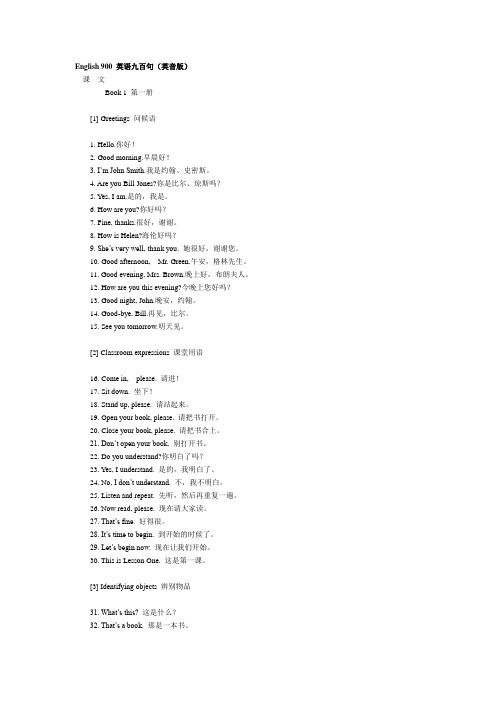
English 900 英语九百句(英音版)课文Book 1 第一册[1] Greetings 问候语1. Hello.你好!2. Good morning.早晨好!3. I’m John Smith.我是约翰、史密斯。
4. Are you Bill Jones?你是比尔、琼斯吗?5. Yes, I am.是的,我是。
6. How are you?你好吗?7. Fine, thanks.很好,谢谢。
8. How is Helen?海伦好吗?9. She’s very well, thank you. 她很好,谢谢您。
10. Good afternoon, Mr. Green.午安,格林先生。
11. Good evening, Mrs. Brown.晚上好,布朗夫人。
12. How are you this evening?今晚上您好吗?13. Good night, John.晚安,约翰。
14. Good-bye, Bill.再见,比尔。
15. See you tomorrow.明天见。
[2] Classroom expressions 课堂用语16. Come in, please. 请进!17. Sit down. 坐下!18. Stand up, please. 请站起来。
19. Open your book, please. 请把书打开。
20. Close your book, please. 请把书合上。
21. Don’t open your book. 别打开书。
22. Do you understand?你明白了吗?23. Yes, I understand. 是的,我明白了。
24. No, I don’t understand. 不,我不明白。
25. Listen and repeat. 先听,然后再重复一遍。
26. Now read, please. 现在请大家读。
27. That’s fine. 好得很。
English900英语九百句(美音版)

English900英语九百句(美音版)一、基本交流篇2. Good morning! 早上好!3. Good afternoon! 下午好!4. Good evening! 晚上好!6. I'm fine, thank you. 我很好,谢谢。
7. And you? 你呢?8. Not bad, thanks. 不错,谢谢。
10. Nice to meet you. 很高兴见到你。
二、日常问候篇11. How's your day going? 你今天过得怎么样?12. What have you been up to? 你最近在忙什么?13. Long time no see! 好久不见!14. It's been a while. 好一阵子没见了。
15. How's everything? 一切都好吗?16. How's life treating you? 生活对你怎么样?17. What's new? 有什么新鲜事吗?18. How's the family? 家人怎么样?19. How's work/school? 工作或学校怎么样?20. Are you keeping well? 你身体还好吗?三、表达感谢与回应篇21. Thank you. 谢谢你。
22. Thanks a lot. 非常感谢。
23. I really appreciate it. 我真的很感激。
25. Don't mention it. 不用谢。
26. My pleasure. 我很高兴。
27. No problem. 没问题。
28. Anytime. 随时都可以。
29. It's my pleasure to help. 能帮忙我很高兴。
30. I owe you one. 我欠你一个人情。
四、道歉与原谅篇31. Excuse me. 对不起,打扰一下。
英语九百句(疯狂英语)最新校对版

疯狂英语脱口而出900句本文网上到处在转,我也是DOWN下来的,不过仔细阅读,却发现很多错误,字母拼错的,忘记翻译的,翻译不准确的……无奈之下,一一校对,随人疏漏仍难免,但一定已经有了至少50处修正。
(Julian Zhang)1. I see.我明白了。
2. I quit! 我不干了!3. Let go! 放手!4. Me too.我也是。
5. My god! 天哪!6. No way! 不行!7. Come on.来吧(赶快)8. Hold on.等一等。
9. I agree. 我同意。
10. Not bad.还不错。
11. Not yet.还没。
12. See you.再见。
13. Shut up! 闭嘴!14. So long.再见。
15. Why not? 好呀! (为什么不呢?)16. Allow me.让我来。
17. Be quiet! 安静点!18. Cheer up! 振作起来!19. Good job! 做得好!20. Have fun! 玩得开心!21. How much? 多少钱?22. I'm full.我饱了。
23. I'm home.我回来了。
24. I'm lost.我迷路了。
25. My treat.我请客。
26. So do I.我也一样。
27. This way. 这边请。
28. After you.您先。
29. Bless you! 祝福你!30. Follow me.跟我来。
31. Forget it! 休想! (算了!)32. Good luck! 祝好运!33. I decline! 我拒绝!34. I promise.我保证。
35. Of course! 当然了!36. Slow down! 慢点!37. Take care! 保重!38. They hurt.它(伤口)很疼。
39. Try again.再试试。
40. Watch out! 当心。
英语听力口语900句
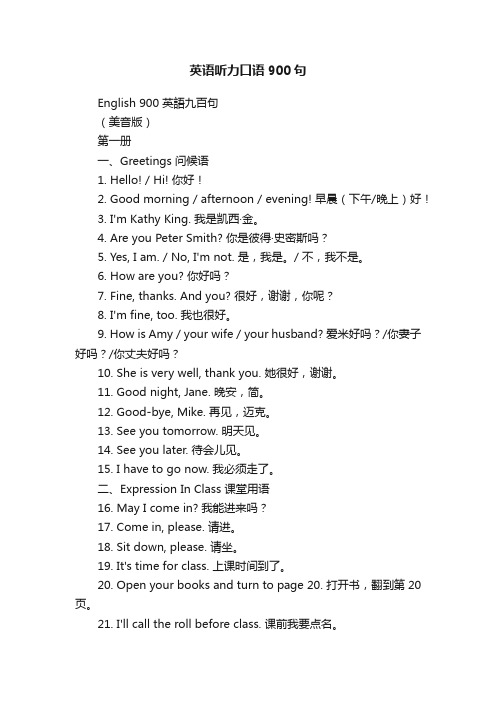
英语听力口语900句English 900 英語九百句(美音版)第一册一、Greetings 问候语1. Hello! / Hi! 你好!2. Good morning / afternoon / evening! 早晨(下午/晚上)好!3. I'm Kathy King. 我是凯西·金。
4. Are you Peter Smith? 你是彼得·史密斯吗?5. Yes, I am. / No, I'm not. 是,我是。
/ 不,我不是。
6. How are you? 你好吗?7. Fine, thanks. And you? 很好,谢谢,你呢?8. I'm fine, too. 我也很好。
9. How is Amy / your wife / your husband? 爱米好吗?/你妻子好吗?/你丈夫好吗?10. She is very well, thank you. 她很好,谢谢。
11. Good night, Jane. 晚安,简。
12. Good-bye, Mike. 再见,迈克。
13. See you tomorrow. 明天见。
14. See you later. 待会儿见。
15. I have to go now. 我必须走了。
二、Expression In Class 课堂用语16. May I come in? 我能进来吗?17. Come in, please. 请进。
18. Sit down, please. 请坐。
19. It's time for class. 上课时间到了。
20. Open your books and turn to page 20. 打开书,翻到第20页。
21. I'll call the roll before class. 课前我要点名。
22. Here! 到!23. Has everybody got a sheet? 每个人都拿到材料了吗?24. Any different opinion? 有不同意见吗?25. Are you with me? 你们跟上我讲的了吗?26. Have I made myself clear? 我讲明白了吗?27. Could you say it again? 你能再说一遍吗?28. Any questions? 有什么问题吗?29. That's all for today. 今天就讲到这里。
English 900 英语九百句(英音版)
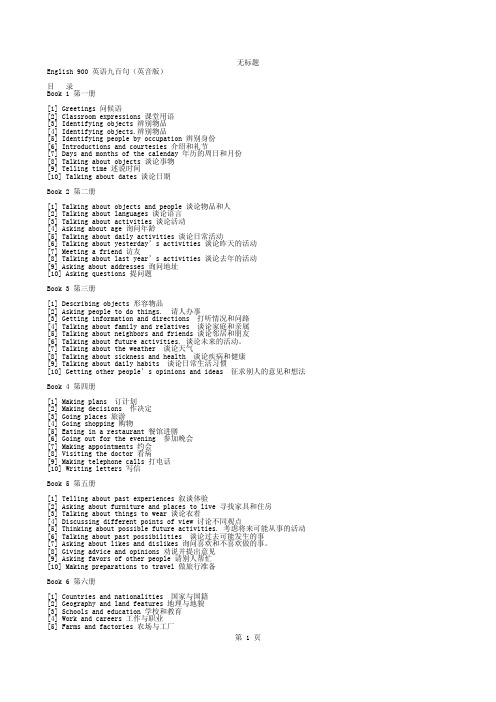
English 900 英语九百句(英音版)目 录Book 1 第一册[1] Greetings 问候语[2] Classroom expressions 课堂用语[3] Identifying objects 辨别物品[4] Identifying objects.辨别物品[5] Identifying people by occupation 辨别身份[6] Introductions and courtesies 介绍和礼节[7] Days and months of the calenday 年历的周日和月份[8] Talking about objects 谈论事物[9] Telling time 述说时间[10] Talking about dates 谈论日期Book 2 第二册[1] Talking about objects and people 谈论物品和人[2] Talking about languages 谈论语言[3] Talking about activities 谈论活动[4] Asking about age 询问年龄[5] Talking about daily activities 谈论日常活动[6] Talking about yesterday’s activities 谈论昨天的活动[7] Meeting a friend 访友[8] Talking about last year’s activities 谈论去年的活动[9] Asking about addresses 询问地址[10] Asking questions 提问题Book 3 第三册[1] Describing objects 形容物品[2] Asking people to do things. 请人办事[3] Getting information and directions 打听情况和问路[4] Talking about family and relatives 谈论家庭和亲属[5] Talking about neighbors and friends 谈论邻居和朋友[6] Talking about future activities. 谈论未来的活动。
英语900句(经典)电子版本

英语900句(经典)English 900 英语九百句(美音版)第一册一、 Greetings1. Hello! / Hi!2. Good morning / afternoon / evening!3. I'm Kathy King.4. Are you Peter Smith?5. Yes, I am. / No, I'm not.6. How are you?7. Fine, thanks. And you?8. I'm fine, too.9. How is Amy / your wife / your husband?10. She is very well, thank you.11. Good night, Jane.12. Good-bye, Mike.13. See you tomorrow.14. See you later.15. I have to go now.二、Expression In Class16. May I come in?17. Come in, please.18. Sit down, please.19. It's time for class.20. Open your books and turn to page 20.21. I'll call the roll before class.22. Here!23. Has everybody got a sheet?24. Any different opinion?25. Are you with me?26. Have I made myself clear?27. Could you say it again?28. Any questions?29. That's all for today.30. Please turn in your paper before leaving.三、Identifying Objects31. What's this?32. It's a pen. 33. Is this your handbag?34. No, it isn't. / Yes, it is.35. Whose pen is this?36. It's Kate's.。
可可英语 英语专四听写
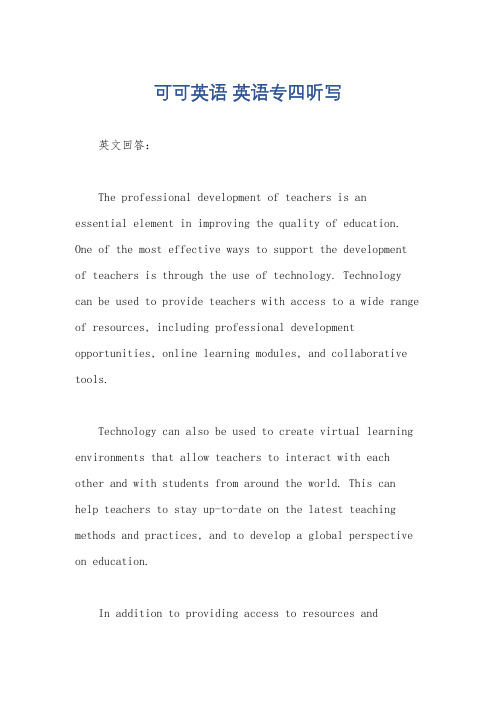
可可英语英语专四听写英文回答:The professional development of teachers is anessential element in improving the quality of education. One of the most effective ways to support the development of teachers is through the use of technology. Technology can be used to provide teachers with access to a wide range of resources, including professional development opportunities, online learning modules, and collaborative tools.Technology can also be used to create virtual learning environments that allow teachers to interact with each other and with students from around the world. This can help teachers to stay up-to-date on the latest teaching methods and practices, and to develop a global perspective on education.In addition to providing access to resources andcreating learning opportunities, technology can also beused to assess teacher development. Online assessments can be used to track teachers' progress, and to identify areas where they need additional support. This information can then be used to tailor professional development activitiesto the specific needs of individual teachers.The use of technology in teacher development has the potential to significantly improve the quality of education. By providing teachers with access to a wider range of resources, creating virtual learning environments, and enabling the assessment of teacher progress, technology can help teachers to develop the skills and knowledge they need to be effective educators.中文回答:教师的专业发展是提高教育质量的一个重要因素。
英语900句(经典)
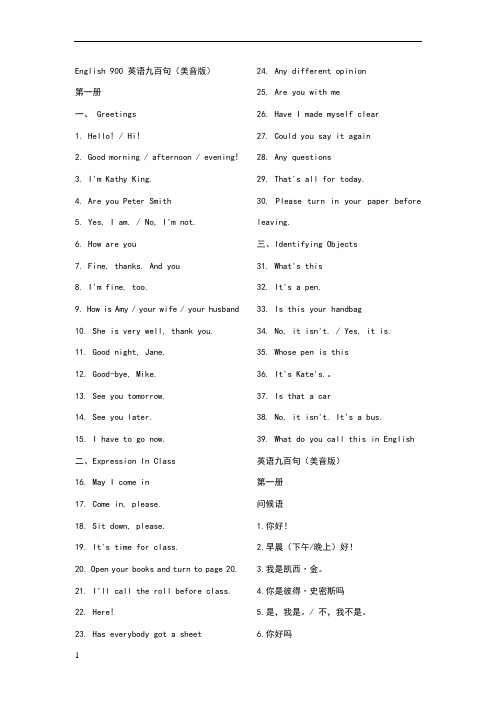
v1.0 可编辑可修改English 900 英语九百句(美音版)第一册一、 Greetings1. Hello! / Hi!2. Good morning / afternoon / evening!3. I'm Kathy King.4. Are you Peter Smith5. Yes, I am. / No, I'm not.6. How are you7. Fine, thanks. And you8. I'm fine, too.9. How is Amy / your wife / your husband10. She is very well, thank you.11. Good night, Jane.12. Good-bye, Mike.13. See you tomorrow.14. See you later.15. I have to go now.二、Expression In Class16. May I come in17. Come in, please.18. Sit down, please.19. It's time for class.20. Open your books and turn to page 20.21. I'll call the roll before class.22. Here!23. Has everybody got a sheet 24. Any different opinion25. Are you with me26. Have I made myself clear27. Could you say it again28. Any questions29. That's all for today.30. Please turn in your paper before leaving.三、Identifying Objects31. What's this32. It's a pen.33. Is this your handbag34. No, it isn't. / Yes, it is.35. Whose pen is this36. It's Kate's.。
英语900句
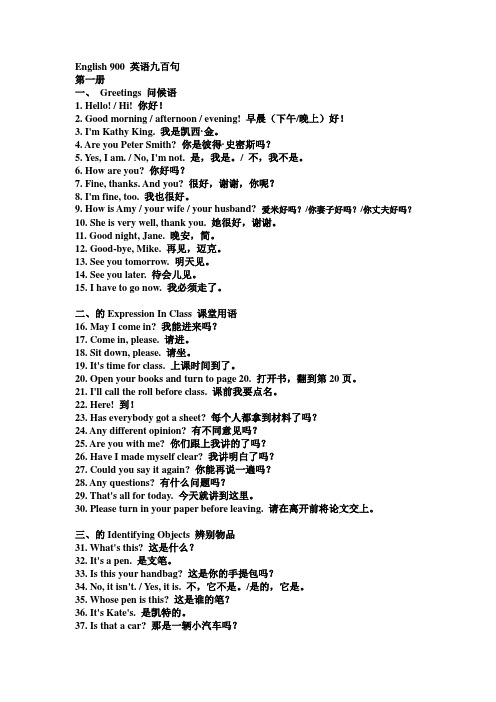
English 900 英语九百句第一册一、Greetings 问候语1. Hello! / Hi! 你好!2. Good morning / afternoon / evening! 早晨(下午/晚上)好!3. I'm Kathy King. 我是凯西·金。
4. Are you Peter Smith? 你是彼得·史密斯吗?5. Yes, I am. / No, I'm not. 是,我是。
/ 不,我不是。
6. How are you? 你好吗?7. Fine, thanks. And you? 很好,谢谢,你呢?8. I'm fine, too. 我也很好。
9. How is Amy / your wife / your husband? 爱米好吗?/你妻子好吗?/你丈夫好吗?10. She is very well, thank you. 她很好,谢谢。
11. Good night, Jane. 晚安,简。
12. Good-bye, Mike. 再见,迈克。
13. See you tomorrow. 明天见。
14. See you later. 待会儿见。
15. I have to go now. 我必须走了。
二、的Expression In Class 课堂用语16. May I come in? 我能进来吗?17. Come in, please. 请进。
18. Sit down, please. 请坐。
19. It's time for class. 上课时间到了。
20. Open your books and turn to page 20. 打开书,翻到第20页。
21. I'll call the roll before class. 课前我要点名。
22. Here! 到!23. Has everybody got a sheet? 每个人都拿到材料了吗?24. Any different opinion? 有不同意见吗?25. Are you with me? 你们跟上我讲的了吗?26. Have I made myself clear? 我讲明白了吗?27. Could you say it again? 你能再说一遍吗?28. Any questions? 有什么问题吗?29. That's all for today. 今天就讲到这里。
English 900 英语九百句(美音版)_百度文库汇总
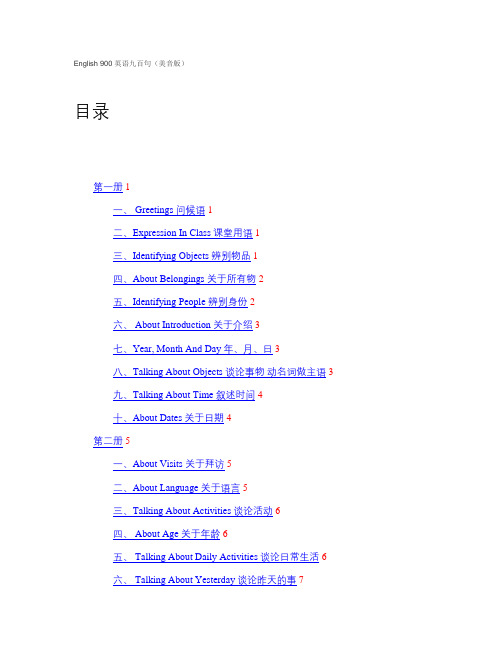
English 900 英语九百句(美音版)目录第一册 1一、 Greetings 问候语 1二、Expression In Class 课堂用语 1三、Identifying Objects 辨别物品 1四、About Belongings 关于所有物 2五、Identifying People 辨别身份 2六、 About Introduction 关于介绍 3七、Year, Month And Day 年、月、日 3八、Talking About Objects 谈论事物动名词做主语 3九、Talking About Time 叙述时间 4十、About Dates 关于日期 4第二册 5一、About Visits 关于拜访 5二、About Language 关于语言 5三、Talking About Activities 谈论活动 6四、 About Age 关于年龄 6五、 Talking About Daily Activities 谈论日常生活 6六、 Talking About Yesterday 谈论昨天的事 7七、 Talking With Friends 与朋友聊天 7八、 Talking About The Past 谈论过去 7九、 Asking About The Address 询问地址 8十、 Asking Questions 提问题 8第三册 9一、 Measuring And Comparing 形容物品、度量、比较 9二、 Asking For Help 寻求帮助 9三、 Asking Directions 打听情况和问路 10四、 About Marriage 关于婚姻 10五、 Talking About Neighbors And Friends 谈论邻居和朋友一般现在时 10六、 Planning The Future 计划将来 11七、 Talking About The Weather 谈论天气 11八、 About Sickness 关于生病 12九、 Talking About Habits 谈论日常生活习惯 12十、 Asking For Other's Opinions 询问别人的意见。
success听写专四原文
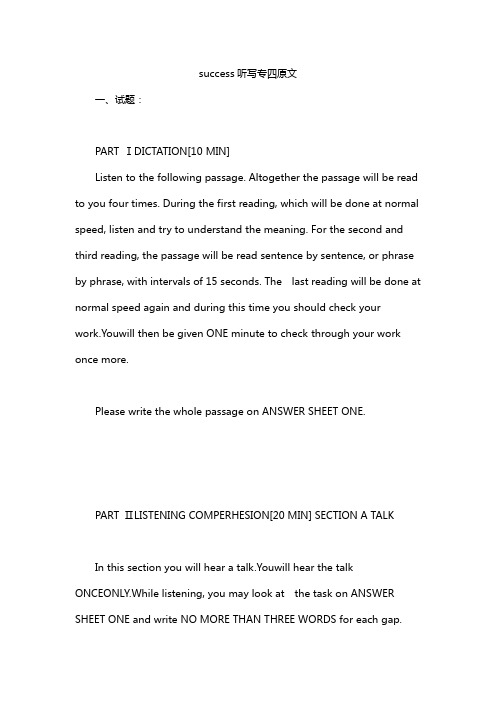
success听写专四原文一、试题:PART ⅠDICTATION[10 MIN]Listen to the following passage. Altogether the passage will be read to you four times. During the first reading, which will be done at normal speed, listen and try to understand the meaning. For the second and third reading, the passage will be read sentence by sentence, or phrase by phrase, with intervals of 15 seconds. The last reading will be done at normal speed again and during this time you should check your work.Youwill then be given ONE minute to check through your work once more.Please write the whole passage on ANSWER SHEET ONE.PART ⅡLISTENING COMPERHESION[20 MIN] SECTION A TALKIn this section you will hear a talk.Youwill hear the talk ONCEONLY.While listening, you may look at the task on ANSWER SHEET ONE and write NO MORE THAN THREE WORDS for each gap.Make sure what you fill in is both grammatically and semantically acceptable.Youmay each gap. Make sure what you fill in is both grammatically and semantically acceptable.Youmay use the blank sheet for note-taking.You have THIRTY seconds to preview the gap-filling task.Now listen to the talk. When it is over, you will be given TWO minutes to check your work.SECTION BCONVERSATINSIn this section you will hear two conversations. At the end of each conversation, five questions will be asked about what was said. Both the conversations and the questions will be spoken ONCEONLY.After each question there will be a ten-second pause. During the pause, you should read the four choices of [A], [B], [C] and [D], and mark the best answer to each question on ANSWER SHEET TWO.You have THIRTY seconds to preview the choices. Now, listen to the conversations.Conversation OneQuestions 1 to 5 are based on Conversation One.1. [A] Many foreign languages are spoken in Britain.[B] Everyone in Britain can speak a foreign language.[C] The British are unable to speak a foreign language.[D] The British can survive on their mother tongue.2. [A] Chinese.[B] Polish.[C] Punjabi.[D] Urdu.3. [A] To help improve international trade.[B] To allow a speaker to hold a simple talk.[C] To improve the education system.[D] To encourage learning another language.4. [A] It gives you self-satisfaction.[B] It makes you more confident.[C] It you an advantage.[D] It makes you work hard.5. [A] Workmates.[B] Schoolmates.[C] Teacher and student.[D] Brother and sister.Conversation TwoQuestions 6 to 10 are based on Conversation Two.6. [A] An unreasonable fear.[B] A dangerous event.[C] A small probability.[D] A risk-assessing ability.7. [A] One in one million.[B] One in four million.[C] One in fourteen million.[D] One in forty million.8. [A] Future events.[B] Catastrophic events.[C] Small-scale disasters.[D] Smoking hazards.9. [A] Traveling by air.[B] Riding a bicycle.[C] Catching bird flu.[D] Smoking cigarettes.10. [A] They get pleasure from risks.[B] They can control potential risks.[C] They can assess danger from risks.[D] They have strong needs for risks.二、听力原文:PART I DICTATIONEmotional Reaction to MusicNo matter who you are, where you live, / or what your cultural background is, / people get some pleasure from listening to their favorite music. / However, some people are simply not capable of enjoying music. / This is not because they can’t experience pleasure at all. / They don’t have trouble hearing music properly, either. / Instead, they’re just indifferent to music. / Researchers have conducted studies to find out / why some people have no emotional reaction to music. / However, despite their efforts, the mystery remains.演讲原文:The Linguistic Gift of BabiesGood morning, everyone. In today's lecture, I'm going to talk about something you can't see. That is, what's going on in the little brain of a baby.For example, how babies learn a language.It is always a question people show great interest in.Babies and children are geniuses until they turn seven, and then there's a systematic decline.Work in my lab is focused on the first critical period in development, and that is the period in which babies try to master which sounds are used in their language.We think, by studying how the sounds are learned, we'll have a model for the rest of language, and perhaps for critical periods that may exist in childhood for social, emotional and cognitive development.So we've been studying the babies by conducting an experiment.During our experiment, the baby, usually a six-monther, sits on a parent's lap, and we train them to turn their heads when a sound changes—like from "ah" to "ee".If they do so at the appropriate time, the black box lights up and a panda bear pounds a drum. What have we learned?Well, babies all over the world are what I like to describe as "citizensof the world".They can discriminate all the sounds of all languages, no matter what country we're testing and what language we're using, and that's remarkable because you know, I can't do that.We're culture-bound listeners.We can discriminate the sounds of our own language, but not those of foreign languages.So the question arises: When do those citizens of the world turn into the language-bound listeners that we are?And the answer: before their first birthdays.What you see here is performance on that head-turn task for babies tested in Tokyo and the United States, here in Seattle, as they listened to the "ra" and "la" —sounds important to English, but not to Japanese.So at six to eight months, the babies are totally equivalent.Two months later, something, something incredible occurs.The babies in the United States are getting a lot better while babies in Japan are getting a lot worse.So the question is: What's happening during this critical two-month period?We know this is the critical period for sound development, but what's going on up there?Maybe there are two things going on.The first is that the babies are listening intently to us, and they're taking statistics as they listen to us talk—they're taking statistics.That is to say, the two babies listen to their own mother speaking motherese—the universal language we use when we talk to kids.During the production of speech, when babies listen, what they're doing is taking statistics, that is, sound distribution on the language that they hear.And those sound distributions grow and babies absorb more.And what we've learned is that babies are sensitive to the statistics, and the statistics of Japanese and English are very, very different.I mean, the sound distribution of both languages is different.So babies absorb the statistics of the language and it changes their brains;it changes them from the citizens of the world to the culture-bound listeners that we are because we as adults are no longer absorbing those statistics.In this case, of course, we're arguing that the learning of language material may slow down when our distribution stabilizes.OK. Today, we just talked about a recent project on babies' language development.In our next lecture, we will concentrate on bilingual people, howbilinguals keep two sets of statistics in mind at once.对话原文1:Conversation OneQuestions 1 to 5 are based on Conversation One.W: Hi, Bob. You speak very good Chinese.M: Not really, Mary. I just know a little. Actually, not being able to speak a foreign language is a bit of a British trait or a particularly British characteristic.The British are generally considered to be lazy linguists. We just don't bother to learn another language.W: I guess the main reason is that when you travel around the world, you find that English is spoken almost everywhere.M: Yes, yes. We get by. We survive on just using our mother language.W: But you seem to love learning languages a lot. How many foreign languages can you speak?M: Not that many. A bit of German, some French, Polish a little, Chinese of course, a bit of Japanese. That's about it.W: I'm impressed. Well, what is the second most-spoken language in England? Is it Chinese?M: No, I don't think so.W: Then, that must be French.M: No. According to the recent census, 104 different languages are spoken in the UK and Polish is the second most spoken language, followed by Punjabi and Urdu.W: Then, do you have to learn a foreign language in school?M: No, it's not compulsory. But recently a campaign was launched to encourage everyone in the UK to learn at least 1,000 words of another language. It hopes to help Britain increase international trade.W: 1,000 words?M: Yes. It's called the 1,000 Words Campaign because it says a vocabulary of 1,000 words would allow a speaker to hold a simple conversation.W: That sounds like a good idea.M: Yes. It gives you self-satisfaction and self-esteem if you can speak another language when you're travelling. And I think it also gives you an edge in a lot of different areas in the workplace.You feel good about learning a new skill and you feel good about yourself, and it boosts your confidence. Imagine going on a holiday to Spain and being able to speak to the locals.W: Of course it does make one feel good.M: And there are also the economic benefits of speaking another language. It gives you an advantage, especially if you are dealing with foreign companies.W: Yes. It also shows politeness and respect for other people by showing you have made an effort.M: You're right. Mm, I'm afraid I must get going now. I'll have my Chinese class at 10 o'clock.W: Oh, I have a class at 10 as well. OK, see you later.M: See you.Questions 1 to 5 are based on Conversation One.1. According to the man, what is a British characteristic?2. What is the second most-spoken language in the UK?3. Why was the 1,000 Words Campaign launched?4. According to the man, which is not considered an advantage of learning a foreign language?5. What's the most probable relationship between the man and the woman?对话原文2:Conversation TwoQuestions 6 to 10 are based on Conversation Two.W: Hello, and welcome to today's program. I'm Alice.M: And I'm Jack. Hello.W: Hello, Jack. You're off on holiday tomorrow, aren't you?M: I am and you know, and I'm dreading it. I hate flying!W: Do you? I didn't know you had a phobia—and that means a strong and unreasonable fear of something.M: Well, I don't think this is a phobia because it isn't unreasonable. Flying thousands of feet up in the sky, you know, that's not safe!W: Flying is safer than you think, Jack. It's much riskier to drive or cycle to work. And, actually, risk taking is the subject of today's show!Risk means the chances of something bad happening. For example, did you know that your chance of being knocked off your bicycle and killed during a one-mile journey is the same as your chances of winning the lottery?M: I didn't know that.W: Can you guess what are the chances of either of these two things happening?M: I have no idea. One in a million?W: No, it's one in 14 million. You are as likely to win the national lottery from a single ticket as you are to be knocked off your bicycle and killed during a one-mile journey.M: But why are we bad at assessing risk?W: People typically fear anything which is small probability but it's extremely catastrophic if it were to happen…Recently we have another increase in these birds' virus outbreaks. People read about that.And they may pay a lot of attention to that in the news but they may forget to get their flu shot.M: That's right. We tend to worry about big or catastrophic events such as catching bird flu or dying in a plane crash because we react emotionally to them.W: Yeah. Catastrophic events feel like very real threats, while we tend to forget about the small but chronic risks that become more likely over time.M: We do. So for example, what if there was a cigarette that killed you as soon as you smoked it?Nobody would do that, would they?W: No, they wouldn't.M: But plenty of people are happy to smoke for years, and put off worrying about the health risks for the future.W: Yes, that's a good point, Jack! People feel they are in control of risks that stretch over time. You know, they think, "I could stop tomorrow" or "I could smoke less".But what about people who really enjoy taking big risks—those thrill seekers out there?M: People who enjoy extreme sports actually seek out danger—it gives them extreme pleasure!If the risk is really high, it means that the pleasure needs to be equally high, or hopefully even higher—W: You're right.Questions 6 to 10 are based on Conversation Two.6. According to Alice, what is a phobia?7. What are the chances of getting knocked off one's bicycle and killed in a one-mile journey?8. What kind of event do people tend to worry about?9. Which may involve a chronic risk?10. Why do some people enjoy risks?三、答案:SECTION A TALK1. seven2. sounds3. cognitive4. a sound changes5. six-month-old6. discriminate the7. their first birthda8. totally equivalen9. incredible differe10. taking statisticsSECTION B CONVERSATIONSConversation One1. According to the man, what is a British characteristic?答案:C. The British are unable to speak a foreign language.2. What is the second most-spoken language in the UK?答案:B. Polish.3. Why was the 1,000 Words Campaign launched?答案:A. To help improve international trade.4.According to the man, which is not considered an advantage of learning a foreign language?答案:D. It makes you work hard.5. What’s the most probable relationship between the man and the woman?答案:B. Schoolmates.Conversation Two6. According to Alice, what is a phobia?答案:A. An unreasonable fear.7. What are the chances of getting knocked off one’s bicycle and killed in a one-mile journey?答案:C. One in fourteen million.8. What kind of event do people tend to worry about?答案:B. Catastrophic events.9. Which may involve a chronic risk?答案:D. Smoking cigarettes.10. Why do some people enjoy risks?答案:A. They get pleasure from risks.。
常用英语900句(日常英语九百句)

114. I'll try my best.我尽力而为。
115. I'm On your side.我全力支持你。
116. Long time no see!好久不见!
117. No pain,no gain.不劳无获。
118. Well,it depends噢,这得看情况。
168. If only I could fly.要是我能飞就好了。
169. I'll be right there.我马上就到。
170. I'll see you at six.我六点钟见你。
常用英语900句(日常英语九百句)续
171. IS it true or false?这是对的还是错的?
172. Just read it for me.就读给我听好了。
188. It's against the law.这是违法的。
189. Love me,love my dog.(谚语)爱屋及乌。
190. My mouth is watering.我要流口水了。
191. Speak louder,please.说话请大声点儿。
192. This boy has no job.这个男孩没有工作。
61. Is it yours?这是你的吗?
62. That's neat.这很好。
63. Are you sure?你肯定吗?
64. Do l have to非做不可吗?
65. He is my age.他和我同岁。
66. Here you are.给你。
67. No one knows .没有人知道。
经典英语900句文本
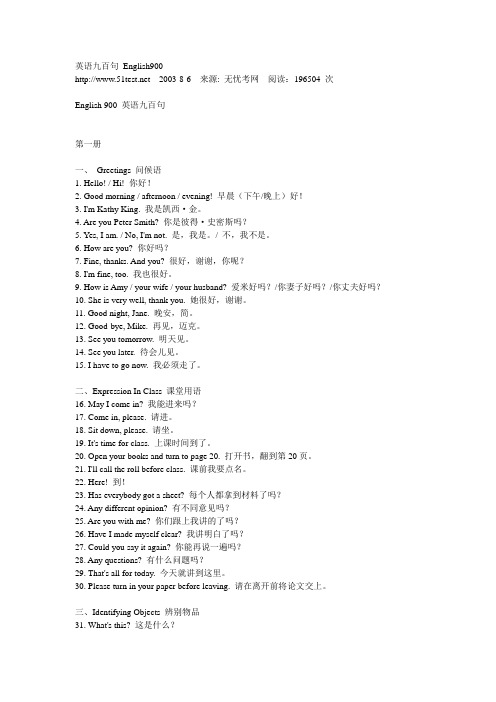
英语九百句English900 2003-8-6 来源: 无忧考网阅读:196504 次English 900 英语九百句第一册一、Greetings 问候语1. Hello! / Hi! 你好!2. Good morning / afternoon / evening! 早晨(下午/晚上)好!3. I'm Kathy King. 我是凯西·金。
4. Are you Peter Smith? 你是彼得·史密斯吗?5. Y es, I am. / No, I'm not. 是,我是。
/ 不,我不是。
6. How are you? 你好吗?7. Fine, thanks. And you? 很好,谢谢,你呢?8. I'm fine, too. 我也很好。
9. How is Amy / your wife / your husband? 爱米好吗?/你妻子好吗?/你丈夫好吗?10. She is very well, thank you. 她很好,谢谢。
11. Good night, Jane. 晚安,简。
12. Good-bye, Mike. 再见,迈克。
13. See you tomorrow. 明天见。
14. See you later. 待会儿见。
15. I have to go now. 我必须走了。
二、Expression In Class 课堂用语16. May I come in? 我能进来吗?17. Come in, please. 请进。
18. Sit down, please. 请坐。
19. It's time for class. 上课时间到了。
20. Open your books and turn to page 20. 打开书,翻到第20页。
21. I'll call the roll before class. 课前我要点名。
英语九百句English900
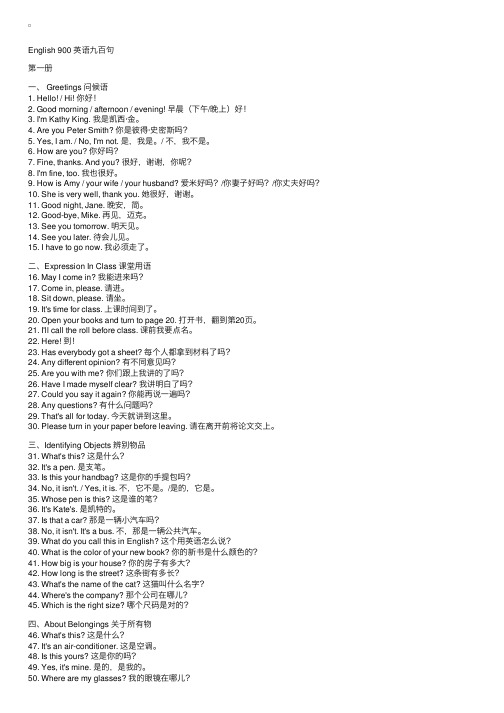
English 900 英语九百句第⼀册⼀、 Greetings 问候语1. Hello! / Hi! 你好!2. Good morning / afternoon / evening! 早晨(下午/晚上)好!3. I'm Kathy King. 我是凯西·⾦。
4. Are you Peter Smith? 你是彼得·史密斯吗?5. Yes, I am. / No, I'm not. 是,我是。
/ 不,我不是。
6. How are you? 你好吗?7. Fine, thanks. And you? 很好,谢谢,你呢?8. I'm fine, too. 我也很好。
9. How is Amy / your wife / your husband? 爱⽶好吗?/你妻⼦好吗?/你丈夫好吗?10. She is very well, thank you. 她很好,谢谢。
11. Good night, Jane. 晚安,简。
12. Good-bye, Mike. 再见,迈克。
13. See you tomorrow. 明天见。
14. See you later. 待会⼉见。
15. I have to go now. 我必须⾛了。
⼆、Expression In Class 课堂⽤语16. May I come in? 我能进来吗?17. Come in, please. 请进。
18. Sit down, please. 请坐。
19. It's time for class. 上课时间到了。
20. Open your books and turn to page 20. 打开书,翻到第20页。
21. I'll call the roll before class. 课前我要点名。
22. Here! 到!23. Has everybody got a sheet? 每个⼈都拿到材料了吗?24. Any different opinion? 有不同意见吗?25. Are you with me? 你们跟上我讲的了吗?26. Have I made myself clear? 我讲明⽩了吗?27. Could you say it again? 你能再说⼀遍吗?28. Any questions? 有什么问题吗?29. That's all for today. 今天就讲到这⾥。
2023-2024人教版九年级Unit4听写单

九年U4 I used to be afraid of the dark.1.保持沉默2.沉默地3.对...有帮助的4.有时5.score含义6.一个亚洲人n与Asia区别8.我过去常常吃垃圾食品。
9.我过去不吃垃圾食品。
10.你过去吃垃圾食品吗?11.他过去常常踢足球, 不是吗?12.习惯(做)某事13.被用来做某事14.害怕做…15.我们有足够的时间写作业。
16.他足够大了去上学。
17.since标志现在完成时用法18.看到/听到/发现某人正在做某事19.处理…20.dare用法21.大量的…22.要求做某事23.要求某人做某事24.19岁的25.开始做26.整个学校27.把...解释给某人28.能够做某事29.一直30.担心...31.出现32.不再33.闲逛34.准备好做某事35.为...做好准备36.通向成功的路门的钥匙37.许多......的数量38.翻译make it39.European与Europe区别40.一个欧洲人41.African与Africa区别42.一个非洲人43.英国,3个表达44.发表演讲45.公开地46.一只蚂蚁47.seldom 用法48.对某人有影响49.缺席...50.present词性及含义51.在..上失败在...上成功52.失败做某事53.一场考试54.亲自55.exactly含义56.为...而骄傲57.自我介绍把某人介绍给某人58.对...感到紧张59.在(做)某事上有困难60.照顾61.对...感兴趣62.决定做某事63.把某人送到某地派某人去做某事64.建议某人做某事。
English 900 英语九百句(第四册)

三、 Traveling 旅游
• 486. I only had time to visit Edinburgh. 我 只有时间去爱丁堡。 • 487. How did you like it? 你喜欢那儿吗? • 488. It's fantastic. 那儿棒极了。 • 489. Why did you go there? 你为什么去那 儿? • 490. I went there on business. 我出差到那 儿。
三、 Traveling 旅游
• 491. And do you have friends there? 你在 那儿有朋友吗? • 492. Yes, a lot of friends. 是的,很多。 • 493. You must have enjoyed yourself. 你 一定玩的很开心。 • 494. Yes, and I took many pictures. 是的, 我还照了好多照片。 • 495. Please let me see them. 让我看看。
二、 About Decisions 关于决定
• 471. I'm determined to leave. 我决意要走 了。 • 472. Have you decided? 你决定了吗? • 473. No, I haven't decided yet. 不,还没有。 • 474. I've changed my mind. 我改注意了。 • 475. It's still undecided. 还没决定。
五、 In The Restaurant 餐馆进餐
• 511. What would you like to eat? 你想吃点什么? • 512. Are you ready to order? 你要点菜了吗? • 513. I'd like some steak and bread. 我要牛排和 面包。 • 514. What would you like for dessert? 你要什么 甜点? • 515. I'll have some ice cream. 我要冰淇淋。
- 1、下载文档前请自行甄别文档内容的完整性,平台不提供额外的编辑、内容补充、找答案等附加服务。
- 2、"仅部分预览"的文档,不可在线预览部分如存在完整性等问题,可反馈申请退款(可完整预览的文档不适用该条件!)。
- 3、如文档侵犯您的权益,请联系客服反馈,我们会尽快为您处理(人工客服工作时间:9:00-18:30)。
英语九百句听写:四:451.Let‟s sit down for a few minutes.452.I can clean up later.453.I can do it by myself in the morning.454.It‟s too bad Paulo had to work late.455.I could tell.456.As a matter of fact,you made every body feel comfortable.457.I was tired of giving parties by myself.458.You know,when I was a teenager,I used to go to the parties all the time.459.I enjoyed myself every minute-parties,dances,boys.460.I used to live from dance to dance.461.On the weekends,Paulo and I never used to be home.462.It‟s a long story.463.Then I‟ll tell you about myself.464.The kitchen is too small for two.465.Make yourself at home.466.How did they like it?467.V ery much.468.In fact,we‟re starting the project immediately.469.And guess who‟s in charge?470.You give up too easily.471.You work harder than anyone else in that office.472.You even eat more quickly than you used to.473.He paints better than anyone? I know.474.We won‟t announce the contest until Mr.Crowford finishes the brochure.475.It‟s large enough,and modern and businesslike.476.And very formal-too formal,perhaps.477.Either he does well this year,or he gives up art and goes into business with his father.478.How well is “well”?479.How is he going to measure “success”?480.Does he have to paint as well as the masters?481.He looks just like me,you know ,Joana.482.At least he used to.483.He‟s eighteen months older than I am,but as kids we used to wear the same clothes and pretend we were twins!484.He was too busy.485.Gary and I went to the same college,but that‟s when things started to change.486.Because my father wanted him to.487.Gary and I saw each other less and less.488.When Gary graduated,he went to work for my father.489.Like my father,Gary was always busy.490.He never forgets a face.491.I would like to write about two people,a man and a woman.492.They live quiet lives.493.When they go out into the street,no one asks for their autographs,but everyone in their profession knows and respects them.494.They work as a team.495.They met on their first job.496.The magazine send them all over the world to cover important events.497.One day,the magazine went bankrupt.498.Many other magazines and newspapers offered them positions,but at this point the man and the woman decide to work independently.499.He wanted to work on a photographic essay of bonsai.500.For once,they did not worry about deadlines and editors.501.Don‟t feel so sorry for yourself.502.Nobody likes to get out and look for a job.503.I‟m getting depressed again.504.It‟s time for a change.505.I don‟t hate work-that‟s why I got the job with Crawford-but I don‟t like offices.506.I‟d rather work with people than with files and typewriters.507.I could be a real estate agent,a travel agent,a...anything,as long as it isn‟t boring.508.I think I…d to be my own boss.509.I must be getting hungry.510.Maybe I am getting a cold.511.Can you tell me where the Japanese garden is?512.It‟s quite a long walk from here.513.It stops right over there,in the Plaza of Nations.514.Between the statue and the fountain.515.Would you do me a favour?516.Would you take this gentleman to the bus stop over there?517.My father says I shouldn‟t ask so many questions.518.So I‟m sorry.519.But I still want to know.520.Ali,the next bus will be here any minute.521.I think it‟s too quiet there,but I‟ll go with you if you want.522.But if you come with me,your parents won‟t know where you are.523.If you wait,I‟ll tell my parents where I‟m going.524.Maybe some other time.525.Do you come here a lot?526.One day while I was coming down the 88th street,I tripped and fell.527.My packages spilled all over the sidewalk.528.I twisted my ankle,and I couldn‟t stand up.529.A couple was passing by and helped me pick up my groceries.530.Then,as we were walking home,he metioned he lived in the neighborhood.531.So I made a friend.532.I‟m just putting two and two together.533.Neither did I.534.They don‟t seem to have much in common.535.To make a long story short,Michael‟s old girlfriend fell in love with Pedro. 536.That‟s understandable.537.Yes,but now Michael is seeing Joana,I hope he‟ll forgive Pedro.538.I know,but I think a good friendship deserves a second chance.539.So do I,but…540.Every time I see him he‟s with a different woman.541.But I must ask you not to tell anyone who he is.542.He never stops talking about Mr.O‟Neill.543.Ali is very…what‟s the word in English…imaginative.544.He enjoys pretending to be you,Sergeant.545.And he loves to talking to you about baseball.546.He keeps trying to learn,but I don‟t know how to play,so I can‟t teach him. 547.But tell me Sergeant,how did you know those three were theives?548.They kept walking back and forth in front of the bank.549.After watching them for three days,I knew something was going to happen soon. 550.Why did you wait three days before acting?551.We needed more proof,so I started noting their movements carefully.552.I sold ice cream right under their noses.553.I‟m impressed,Sergeant,impressed and grateful.554.I bet Mr. O‟Neill did it!555.When I grow up,I want to be a secret agent like Mr.O‟Neill.556.It‟s been a long time.557.Yes,it has.558.How have you been?559.Much better since I spoke to you last.560.I haven‟t seen her for almost three years.561.Haven‟t you kept in touch?562.There was no reason to.563.It‟s over.564.What more can I say?565.Let‟s have a beer and forget the whole thing.566.Are you still interested in photography?567.Yes,and I have done a lots of new things.568.I‟ve missed her.569.She‟s missed you,too.570.So has the rest of my family.571.Eighty-eighth Street is usually a busy street,epecially during the summer. 572.But sometimes,early in the morning and in the heat of the afternoon it‟s quiet. 573.They don‟t seem to notice the heat,the darkness,or the passing cars.574.It‟s a street like many others.575.Young men and women walk slowly,arm in arm,or hand in hand.576.When friends meet,they stop and say a word or two.577.Two women,both lost in thought,walk toward each other.578.As they pass,they look up.579.After a minute or two,one turns around and walks the other to her door.580.Then they takes a few steps,turns,and waves goodbye.581.They were trying to look and act like tourists,but they obviously were not.582.They even noted when and where I move my ice cream cart.583.On June 5,at exactly 2:20,when two of the four guards were out of lunch,the three suspects moved toward the entrance of the bank.584.I immediately called for help.585.I wanted to be able to stop them from leaving the area.586.Most of the people in the bank didn‟t know what was happening.587.Meanwhile,the other non-uniformed policemen arrived.588.Some went into the bank,and some stood near the front.589.Then we got them.590.I never stopped selling ice cream,although I gave one man too much change.591.I know it‟s old fashioned,but that‟s what I like about it.592.But that‟s all right,some things look better in the dark.593.Besides,you don‟t go to the bar to read,do you?594.You can get a beer on your way home from work, find some friends,relax,and forget about your kids,your job,and your mother-in-law.595.Times are changing,but Joe‟s stays the same.596.This kind of place used to be”for men only”.597.Now,everybody is welcome.598.If your money is good,we‟re glad to have you.599.I‟ve been a bartender here for thirty years,and I‟m still happy to come to work and see the old mahogany bar.600.It still makes me happy to see the liquor bottles beside the old French mirror.。
